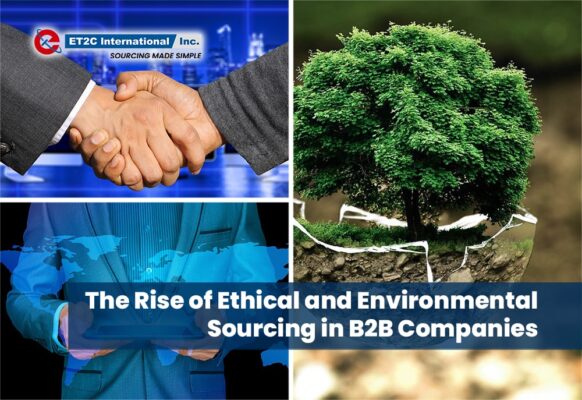

There are several factors driving this trend. Consumers are more aware than ever of the social and environmental impact of their purchasing decisions, and they are demanding more from the companies they do business with. Businesses are also facing increasing pressure from investors and regulators to adopt more sustainable practices. This is reflected in their need for their strategic sourcing plans to be grounded in a clear understanding of the environmental impact of their supply chain decisions. For many sourcing and procurement teams this additional complex workload is creating both pressure on time to deliver but also stretching skills sets into a new and complex area. Companies both large and small are reaching out to Global Sourcing specialists to support their journey towards more ethical sourcing.
In response to these pressures, and the need to deliver corporate sustainability and environmental commitments many B2B companies are adopting ethical and environmental sourcing policies. These policies can cover a wide range of issues, such as labour rights, environmental sustainability, and human rights. As
Challenges to overcome in delivering an Ethical sourcing strategy

However, there are also some challenges that B2B companies must overcome in order to successfully implement ethical and environmental sourcing strategies. These challenges include:
- Identifying and vetting suppliers. It can be difficult to find suppliers that meet the company’s ethical and environmental standards. Especially when your supply chain can be spread over several countries and thousands of miles
- Measuring and tracking progress. It can be difficult to measure the impact of ethical and environmental sourcing initiatives. Over reliance on questionnaires can lead to frustration across your supply chain and “form fatigue”
- Gaining buy-in from stakeholders. You will inevitably encounter a range of levels of support to your ambitions in ethical and environmental sourcing initiatives.
- Managing costs. Ethical and environmental sourcing practices can sometimes be more expensive than traditional sourcing practices.
- Communicating effectively. It is important to communicate the company’s ethical and environmental sourcing policies to both internal and external stakeholders.
Despite these challenges, the benefits of ethical and environmental sourcing are clear. B2B companies that can overcome these hurdles will be well-positioned for long-term success.
ET2C International Sourcing Strategy Experts for twenty years
ET2C International has for over twenty years played a crucial role connecting global brands and companies with Asian suppliers. Our expertise in global sourcing can make sure you get all the benefits of global sourcing without any of the risks.
Our 250 colleagues are based in offices in seven key sourcing markets to make your global sourcing simpler. Where language, time zone or business communication practices can make things difficult, our team can be your bridge to your suppliers.
We provide our clients with Factory and Product Audits including Ethical and Environmental reporting. Greenhouse Gas emission reporting to enable reporting of your emissions base. To manage your corporate commitments or reporting in line with new legislation
At ET2C our history of delivering the benefits of global sourcing to our clients with teams on the ground enables quick fast and transparent supply chain reporting and QC checks.
For more information on Ethical and Environment audit and GHG Emissions reporting please drop us a line contact@et2cint.com

B2B Ethical and Sustainable Global Sourcing, the key steps to deliver a pathway to delivery
- Conduct a Supply Chain Assessment:
– Begin by thoroughly assessing your supply chain. Identify key suppliers as they will account for the majority of supply chain impact., Understand their practices, and evaluate potential risks related to labour conditions, environmental impact, and ethical considerations. This assessment serves as a foundation for developing targeted improvement strategies.
- Define Ethical Sourcing Criteria:
– Clearly define the ethical sourcing criteria that align with your company’s values and sustainability commitments. This may include fair labour practices, environmentally sustainable sourcing, animal welfare considerations, and adherence to human rights principles.
- Engage Suppliers in Dialogue:
– Establish open communication channels with suppliers. Engage in a dialogue to communicate your ethical sourcing expectations and understand their current practices. Collaboration with suppliers is key to fostering a shared commitment to ethical principles.
- Integrate Ethical Sourcing into Policies:
– Embed ethical sourcing principles into your company’s policies and codes of conduct. Ensure that these policies are communicated to all stakeholders, including employees, suppliers, and customers. Clearly articulate the consequences for non-compliance.
- Implement Training Programs:
– Educate employees and suppliers about the importance of ethical sourcing and provide training on best practices. This empowers individuals within the supply chain to make informed decisions and actively contribute to ethical sourcing goals.
- Leverage Technology for Transparency:
– Embrace technology solutions, such as blockchain or supply chain management software, to enhance transparency in the supply chain. These technologies can trace the journey of products from origin to destination, providing real-time data on sourcing practices.
- Collaborate with Industry Initiatives:
– Participate in industry-wide initiatives and partnerships focused on ethical sourcing. Collaborating with like-minded organizations can amplify the impact of ethical sourcing efforts and contribute to sector-wide improvements.
Summary and next steps in ethical sourcing
smiling person jumping over hurdlConclusion
Ethical and environmental sourcing is a complex issue, but it is one that is becoming increasingly important for B2B companies. Companies that are able to successfully implement ethical and environmental sourcing strategies will be well-positioned for long-term success.
By taking these steps, B2B companies can overcome the challenges of ethical and environmental sourcing and reap the many benefits of these practices. Working with an experienced global sourcing company can help you to quickly deliver this process and move your ethical sourcing agenda forwards rapidly.
If you would like to explore this topic or have any questions on ethical sourcing and procurement of supply chain emissions measurement, please drop us a line at contact@et2cint.com

